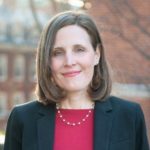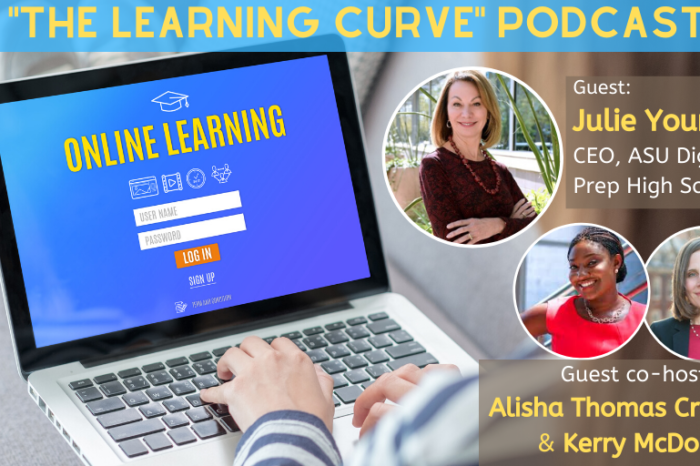Julie Young, Virtual Schooling Pioneer
This week on “The Learning Curve,” guest co-hosts Alisha Thomas Cromartie & Kerry McDonald talk with Julie Young, Deputy Vice President of Education Outreach and Student Services for Arizona State University and CEO of ASU Prep Digital High School. In 2019, 2.7 million K-12 students had an online schooling experience, an 80 percent increase since 2009, with 32 states offering fully online schools. Julie explains the wide appeal of online education for students of all kinds, especially those with learning differences, who are seeking a positive academic experience and more flexibility. They also discuss which states are leading the way and lagging behind, the variety and growth of digital learning programs, and how they enable students to accelerate their learning and contain the costs of higher education.
Stories of the Week: In his State of the Union Address this week, President Trump called on Congress to pass a tax credit scholarship program for low-income students to attend private and religious schools. But is this the proper role of the federal government? Where are the administration’s other proposals for improving public education, and is the rhetoric around school choice becoming politicized? A new report finds that 21 states have made it a high school graduation requirement that students pass a financial literacy course. Is this a welcome opportunity to help young people develop responsible budgeting skills and habits, or is it a form of state-mandated intrusion into subject matter that should be covered at home?
The next episode will air on February 14th, with guest Neal McCluskey, Director of Cato’s Center for Educational Freedom.
Interview Guest:
 Julie Young is the Deputy Vice President of Education Outreach and Student Services for Arizona State University, and the CEO of ASU Prep Digital High School. She is the leading voice for revolutionizing K-12 online education on the global stage. As the founding President and CEO of Florida Virtual School (FLVS), Young and her team grew FLVS into a diversified, worldwide organization creatively serving over 2 million students in 50 states and 68 countries worldwide. Julie graduated with a MEd from the University of South Florida following her undergraduate work at the University of Kentucky.
Julie Young is the Deputy Vice President of Education Outreach and Student Services for Arizona State University, and the CEO of ASU Prep Digital High School. She is the leading voice for revolutionizing K-12 online education on the global stage. As the founding President and CEO of Florida Virtual School (FLVS), Young and her team grew FLVS into a diversified, worldwide organization creatively serving over 2 million students in 50 states and 68 countries worldwide. Julie graduated with a MEd from the University of South Florida following her undergraduate work at the University of Kentucky.
https://www.asuprepdigital.org/leadership/julie-young/
Commentary of the Week:
Frederick Hess in EducationNext: “Slaying Goliath: The Passionate Resistance to Privatization and the Fight to Save America’s Public Schools”
Tweet of the Week:
Today marks the 107th birthday of civil rights activist Rosa Parks.
Parks had a pivotal role in the history of the civil rights movement after she was arrested for refusing to give up her seat on a public bus for a white man. #BlackHistoryMonth https://t.co/Gxumz6cZ6e pic.twitter.com/hm2nx0zB7z
— CBS News (@CBSNews) February 4, 2020
News Links:
US News: Trump Calls on Congress to Pass Federal Tax Credit Scholarship
CNBC: Teaching financial education in schools finally catches on
https://www.cnbc.com/2020/02/04/teaching-financial-education-in-schools-finally-catches-on.html
Next episode’s guest: Neal McCluskey, director of Cato’s Center for Educational Freedom, February 14, 2020.
Guest Co-Hosts:
 Alisha Thomas Cromartie is a former six-term state legislator in Georgia. She was co-author of the state’s constitutional amendment to create a state charter authorizer, and author of the state’s intra-district transfer law. She is former Superintendent of Ivy Prep Schools in Atlanta. She is currently a speaker, author, CEO and host of “Fearless Chic,” a podcast for women. She tweets at @AlishaCromartie.
Alisha Thomas Cromartie is a former six-term state legislator in Georgia. She was co-author of the state’s constitutional amendment to create a state charter authorizer, and author of the state’s intra-district transfer law. She is former Superintendent of Ivy Prep Schools in Atlanta. She is currently a speaker, author, CEO and host of “Fearless Chic,” a podcast for women. She tweets at @AlishaCromartie.
 Kerry McDonald is a Senior Education Fellow at FEE and author of Unschooled: Raising Curious, Well-Educated Children Outside the Conventional Classroom (Chicago Review Press, 2019). She is also an adjunct scholar at The Cato Institute and a regular Forbes contributor. Kerry’s research interests include homeschooling and alternatives to school, self-directed learning, education entrepreneurship, parent empowerment, school choice, and family and child policy. Her articles have appeared at The Wall Street Journal, Newsweek, NPR, Education Next, Reason Magazine, City Journal, and Entrepreneur, among others. She has a master’s degree in education policy from Harvard University and a bachelor’s degree in economics from Bowdoin College. Kerry lives in Cambridge, Massachusetts with her husband and four children. Kerry tweets at: @kerry_edu.
Kerry McDonald is a Senior Education Fellow at FEE and author of Unschooled: Raising Curious, Well-Educated Children Outside the Conventional Classroom (Chicago Review Press, 2019). She is also an adjunct scholar at The Cato Institute and a regular Forbes contributor. Kerry’s research interests include homeschooling and alternatives to school, self-directed learning, education entrepreneurship, parent empowerment, school choice, and family and child policy. Her articles have appeared at The Wall Street Journal, Newsweek, NPR, Education Next, Reason Magazine, City Journal, and Entrepreneur, among others. She has a master’s degree in education policy from Harvard University and a bachelor’s degree in economics from Bowdoin College. Kerry lives in Cambridge, Massachusetts with her husband and four children. Kerry tweets at: @kerry_edu.
Receive Our Updates!
Related Posts















